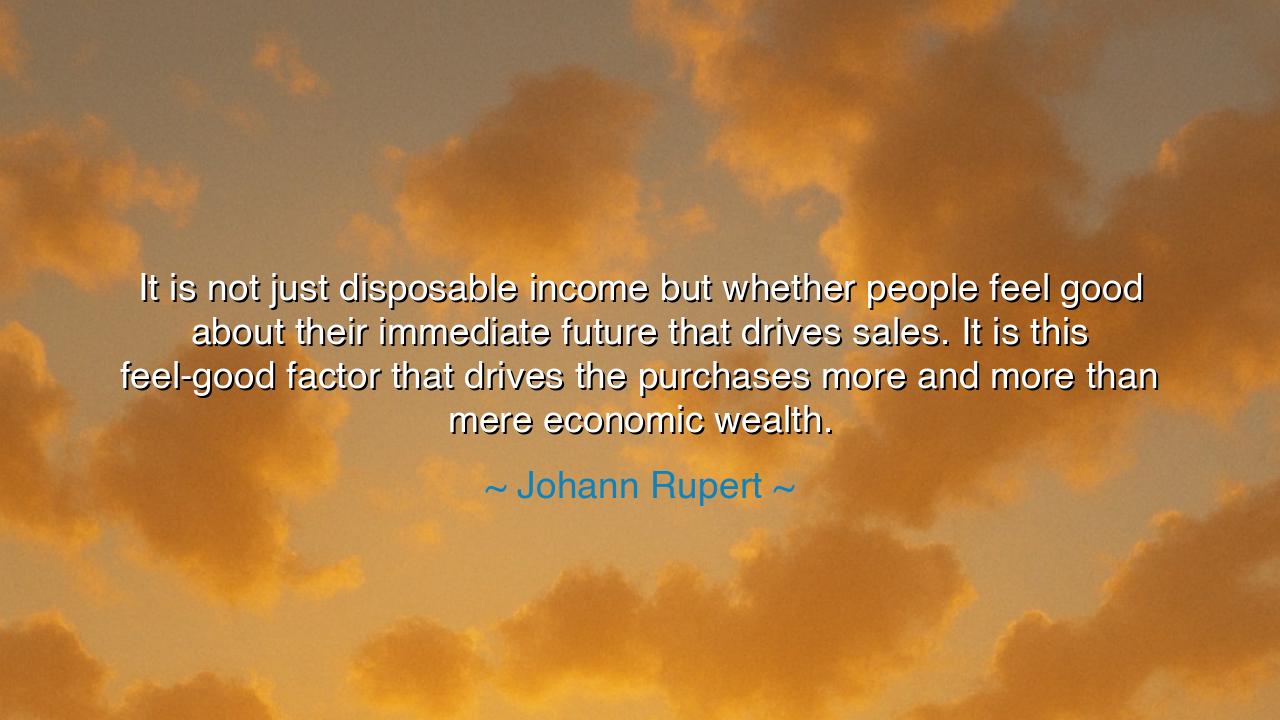
It is not just disposable income but whether people feel good
It is not just disposable income but whether people feel good about their immediate future that drives sales. It is this feel-good factor that drives the purchases more and more than mere economic wealth.






"It is not just disposable income but whether people feel good about their immediate future that drives sales. It is this feel-good factor that drives the purchases more and more than mere economic wealth." These words, spoken by Johann Rupert, speak to a profound understanding of human psychology and the intricate forces that govern consumer behavior. Rupert highlights the powerful role of emotions and perception in driving economic decisions, suggesting that the feel-good factor—a sense of confidence, security, and hope in the future—holds more weight than the simple availability of disposable income. In this way, it is not just the wealth people possess, but their sense of well-being and optimism about what lies ahead that shapes their buying decisions. The desire for comfort, fulfillment, and a hopeful future propels the choices they make more than any tangible measure of economic prosperity.
In the ancient world, the philosophers of old understood that human desires and emotions are central to the choices we make. Aristotle, in his Nicomachean Ethics, wrote extensively on the idea of happiness and well-being, asserting that humans are driven by the pursuit of the good life—a life of balance, virtue, and fulfillment. He believed that a person’s actions are guided not solely by material wealth, but by the deeper desire to live a meaningful and content life. Just as Aristotle understood that emotions and the pursuit of happiness influence our decisions, Rupert recognizes that people are more motivated by how they feel about their future than by what they currently possess.
Consider the great Roman Emperor Augustus, who, after the fall of the Roman Republic, sought to bring stability and prosperity to the Roman people. Augustus understood that economic stability alone was not enough to secure the loyalty of his people—he needed to instill a sense of hope and optimism for the future. By implementing social reforms, improving infrastructure, and promoting a sense of Roman pride, he cultivated a society that believed in its future. Augustus’ success was not just in creating a wealthier empire, but in ensuring that his people felt good about their lives, which in turn, drove their loyalty, productivity, and willingness to invest in the empire’s growth. His reign exemplifies the importance of psychological well-being in the broader context of societal prosperity—a concept echoed in Rupert's insight on consumer behavior.
In more modern times, we see the same principles at play in the rise of consumer-driven economies. During the Great Depression, the most effective leaders were those who were able to instill a sense of hope in the people. Franklin D. Roosevelt, in his inaugural speech, famously said, "The only thing we have to fear is fear itself." His words were not merely about the economy—they were about the emotional state of the nation. By encouraging hope and optimism, Roosevelt was able to guide the country toward recovery. Just as Augustus understood the power of hope, Roosevelt recognized that it was not just about economic stability, but about restoring a sense of confidence in the future that would spur people to take action, work hard, and invest in the nation’s recovery. The feel-good factor was essential to pushing the economy forward.
The same can be seen today in the world of business. Apple, under the leadership of Steve Jobs, revolutionized the technology industry not just by creating high-quality products, but by cultivating a sense of excitement and anticipation around its launches. People did not simply buy Apple products for their technical specifications; they bought them because they believed in the vision that Apple sold—a future of innovation, creativity, and individual empowerment. The emotional connection to the brand was far more important than the disposable income customers had. Jobs created a sense of community and belief in a brighter future through Apple’s products, making each purchase an investment in something greater than just the product itself—it was an investment in a shared dream of what the future could be.
The lesson from Rupert’s quote is that while wealth plays a role in driving economic decisions, it is ultimately our emotions, our sense of hope, and our belief in the future that determine the choices we make. It is not the mere possession of resources, but the confidence and optimism we feel about what lies ahead that shapes our purchasing behaviors, investments, and actions. In this way, businesses, leaders, and individuals alike must recognize the importance of cultivating a sense of well-being and hope in others, for this emotional connection is often the true driver of progress.
In our own lives, we must also remember that hope and optimism are powerful tools for personal success and growth. While financial wealth is important, it is our attitude toward the future that shapes our decisions. Whether in our careers, relationships, or personal aspirations, let us nurture a sense of hope for the future and approach each day with a sense of purpose and belief in what is possible. By doing so, we can drive our own success, regardless of the immediate circumstances. Feel-good factors are not just for the economy—they are the fuel for our personal lives, propelling us toward the future we want to create. Let us embrace the power of hope and optimism, knowing that they are often the most important resources we can invest in.






AAdministratorAdministrator
Welcome, honored guests. Please leave a comment, we will respond soon